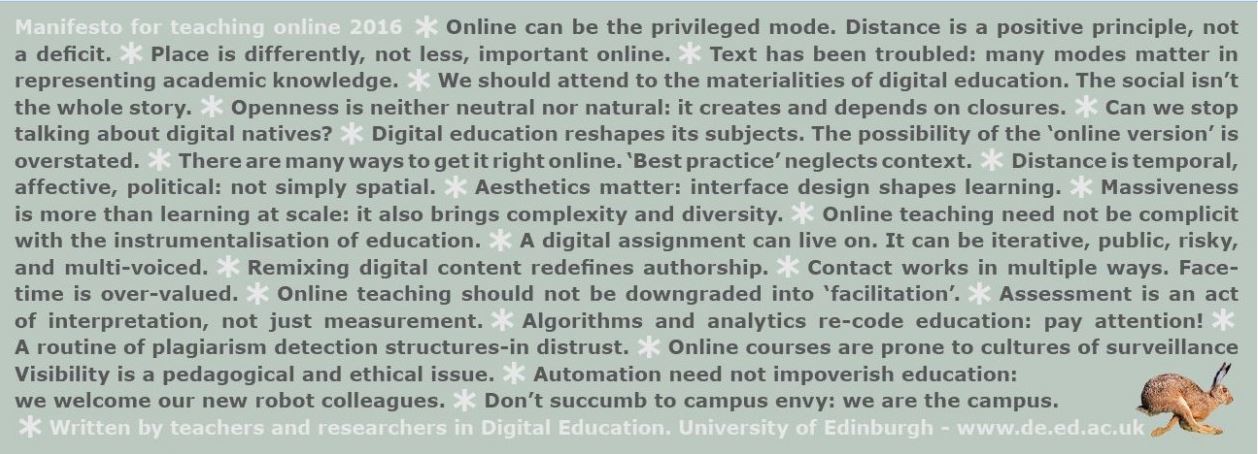The following was reproduced from: https://onlineteachingmanifesto.wordpress.com/the-text/ for the purpose of supporting online annotation and discussion using the hypothes.is tool as part of the Creativity at a Distance workshop.
we are the campus
* Online can be the privileged mode. Distance is a positive principle, not a deficit.
* Place is differently, not less, important online.
* Text has been troubled: many modes matter in representing academic knowledge.
* We should attend to the materialities of digital education. The social isn’t the whole story.
* Openness is neither neutral nor natural: it creates and depends on closures.
* Can we stop talking about digital natives?
* Digital education reshapes its subjects. The possibility of the ‘online version’ is overstated.
* There are many ways to get it right online. ‘Best practice’ neglects context.
* Distance is temporal, affective, political: not simply spatial.
* Aesthetics matter: interface design shapes learning.
* Massiveness is more than learning at scale: it also brings complexity and diversity.
* Online teaching need not be complicit with the instrumentalisation of education.
* A digital assignment can live on. It can be iterative, public, risky, and multi-voiced.
* Remixing digital content redefines authorship.
* Contact works in multiple ways. Face-time is over-valued.
* Online teaching should not be downgraded into ‘facilitation’.
* Assessment is an act of interpretation, not just measurement.
* Algorithms and analytics re-code education: pay attention!
* A routine of plagiarism detection structures-[results?] in distrust.
* Online courses are prone to cultures of surveillance. Visibility is a pedagogical and ethical issue.
* Automation need not impoverish education: we welcome our new robot colleagues.
* Don’t succumb to campus envy: we are the campus.
Written by teachers and researchers in Digital Education. University of Edinburgh – www.de.ed.ac.uk
___________________________________________________________________________
To do:
- Read and review ideas, thoughts, reactions and questions using the annotation tool. Please follow the instructions to annotate using hypothes.is.
- Add your ideas, thoughts, reactions and questions. You can either respond to the comments of others or add completely new ideas. Links to other sites, blogs and tweets are strongly encouraged. Taking RISKS is even MORE strongly encouraged 🙂
- If you have any problems or issues please contact me via email at telias@tru.ca, via Twitter at @eliasto5, or via Mastodon at @tdorey@mastodon.social
- Get creative! I’ve also included a video made based on the Manifesto. Have a creative reaction to the Manifesto? Try adding it as an annotation. If that doesn’t work (and there is a good chance it won’t), contact me using one of the methods above and I’ll share it for you. (Note: I might get more ambitious and add a submission form to gather these, but working on baby steps this week.)
The information gathered will be used to guide a discussion about the Manifesto during the workshop.
